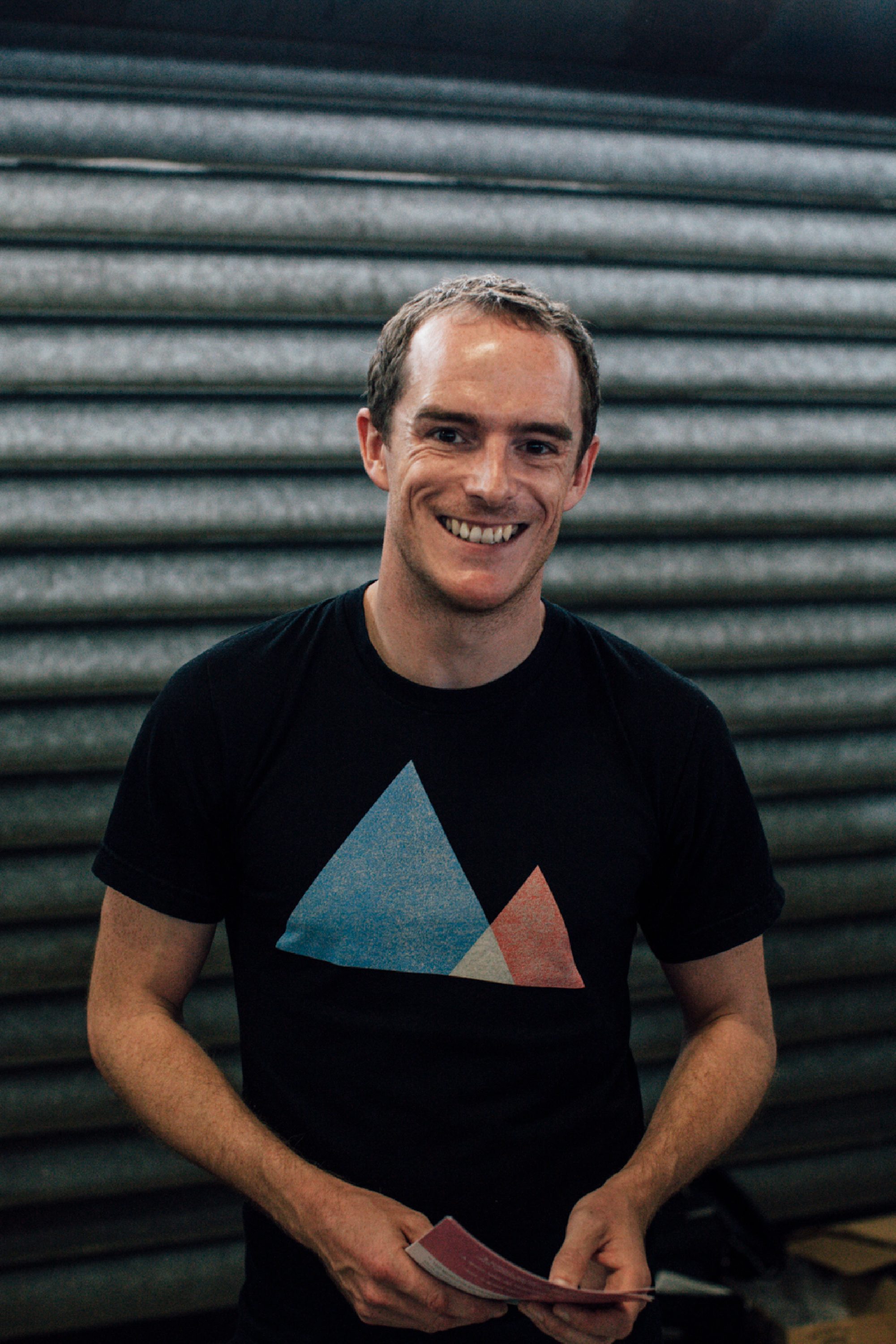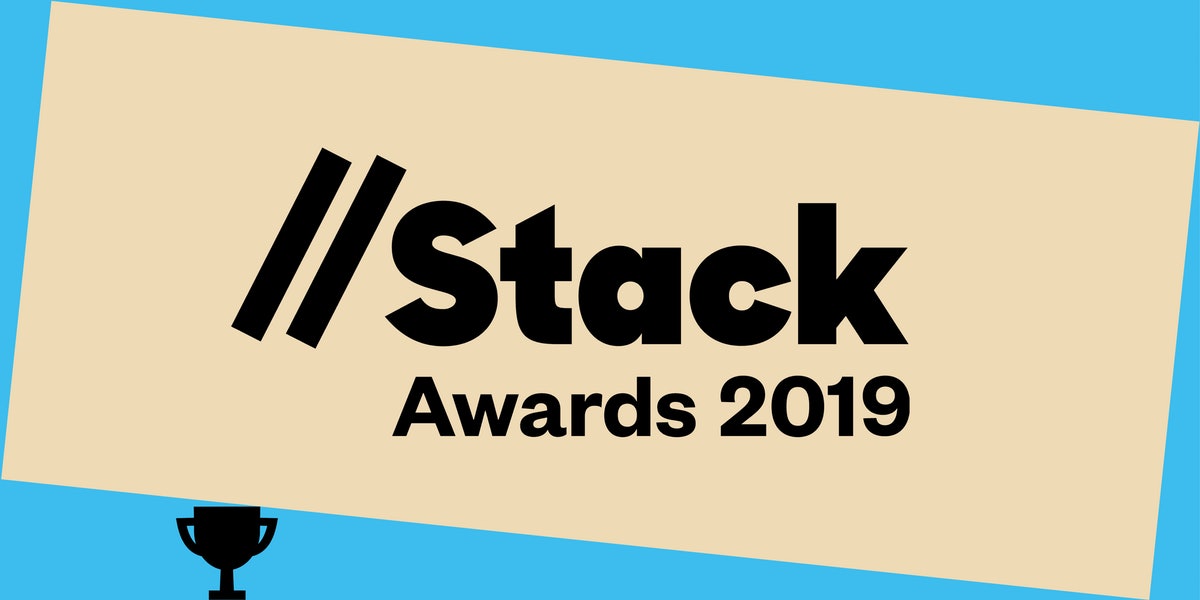art4d GOT THE CHANCE TO GET IN TOUCH WITH STEVEN WATSON OF STACK BEFORE THE START OF BANGKOK ART BOOK FAIR 2019 AND QUICKLY ASKED ABOUT HIS OPINIONS ON THE PRINT INDUSTRY, INDIE MAGAZINES IN PARTICULAR, AS WELL AS WHAT HE LOOKS FORWARD TO SEEING AT THIS YEAR’S FAIR
Interview by Paphop Kerdsup
Portrait: Anna Eckold except as noted
Photo courtesy of the publishers
(For English, please scroll down)
art4d: ช่วยเล่าให้เราฟังถึง Stack หน่อย
Steven Watson: Stack คือบริการที่ช่วยคนค้นหานิตยสารดีๆ แล้วก็ทำการส่งมันออกไปให้ถึงมือคนเหล่านั้นที่อยู่ในทั่วทุกมุมโลก เราทำการส่งนิตยสารหลายพันเล่มในแต่ละเดือน เราเริ่มจากการให้บริการกับคนที่เป็นสมาชิก ก็คือพอคุณสมัครเป็นสมาชิกกับเรา คุณจะไม่มีวันรู้เลยว่านิตยสารเล่มต่อไปที่เราจะส่งให้คุณจะเป็นนิตยสารอะไร แต่สิ่งที่คุณจะรู้แน่นอนก็คือมันจะเป็นนิตยสารอิสระชั้นดีที่คุณจะต้องชอบ ในช่วงหลายปีที่ผ่านมา เราก็ได้ใส่อะไรเข้าไปเพิ่มเติมกับการบริการของเรา อย่างตอนนี้เรามีร้านออนไลน์ ที่ให้คุณเข้าไปดูและซื้อนิตยสารที่คุณสนใจได้ เพราะก็ไม่ใช่ทุกคนที่ชอบเซอร์ไพรส์น่ะครับ บางคนก็อยากจะได้เลือกนิตยสารที่พวกเขาชอบด้วยตัวเอง
นอกจากนี้เรายังมีการจัด Stack Awards ซึ่งก็ดำเนินติดต่อกันมาเป็นเวลาห้าปีแล้ว มันเป็นการเปิดโอกาสให้คนทำนิตยสารจากทั่วโลกได้ส่งผลงานของพวกเขาเข้ามาให้กรรมการที่เป็นผู้เชี่ยวชาญแต่ละสาขาที่เราเชิญมาเป็นผู้ตัดสิน แล้วเราก็มีการจัดงานปาร์ตี้ในเดือนพฤศจิกายนที่เราจะมอบถ้วยรางวัลของให้เรากับคนที่ชนะ อย่างปีนี้เองก็เป็นปีแรกที่เราจะมีเงินรางวัลให้คนชนะด้วย โดยผู้ชนะรางวัล Magazine of the Year ประจำปีนี้ก็จะได้เงินรางวัลมูลค่า 1,000 ปอนด์ จาก Adobe InDesign กลับบ้านไป
art4d: อะไรคือแรงจูงใจที่ทำให้คุณทำ Stack มาเป็นเวลา 11 ปีติดต่อกันแล้ว
SW: ง่ายๆ เลย ผมชอบนิตยสารครับ
art4d: แล้วทำไมคุณถึงชอบนิตยสารนักล่ะ
SW: ทำไมผมถึงชอบเหรอ คือตอนที่ผมเรียนสาขาวิชาภาษาอังกฤษในมหาวิทยาลัย ผมรู้สึกว่านิตยสารน่ะขี้โกงอยู่หน่อยๆ เพราะมันง่ายกว่า มันเต็มไปด้วยภาพขนาดใหญ่ มีคำพูดที่ยกมาแปะไว้ตรงโน้นนิดตรงนี้หน่อย มีหัวข้อใหญ่ๆ ที่เตะตา มีวิธีการต่างๆ มากมายไปหมดที่จะนำความสนใจของคนอ่านไปสู่เรื่องราวสักเรื่อง ซึ่งถ้าเป็นหนังสือทั่วๆ ไปคุณอาจจะหยุดอ่านไปแล้วเพราะมันเต็มไปด้วยตัวหนังสือ คือผมก็อ่านหนังสือนะ แต่ตลอดชีวิตของผม ผมเป็นนักอ่านนิตยสารเสียมากกว่า หลังจากมหาวิทยาลัย ผมก็ทำงานให้กับนิตยสารของสายการบินหนึ่ง ซึ่งงานก็ค่อนข้างจะน่าเบื่อ แล้วก็บังเอิญว่าด้านล่างที่ทำงานผมตอนนั้นเนี่ย มีร้านขายนิตยสารอินดี้อยู่พอดี ซึ่งผมว่าผมเองก็ไม่ค่อยรู้เรื่องนิตยสารอินดี้อะไรมาก่อนหน้านั้นเท่าไหร่ แต่ผมก็มักจะใช้เวลาแทบทุกวันเดินลงไปที่ร้าน ไปดูนิยตสารที่ทำออกมาได้สวยสุดๆ แล้วก็เริ่มที่จะรู้จักงานสิ่งพิมพ์เจ๋งๆเหล่านั้นที่ไม่มีเพื่อนของผมคนไหนรู้จักเลยสักคน
จากนั้นผมก็เริ่มมีนิยตสารเล่มที่ผมชอบเป็นพิเศษ แล้วก็เริ่มได้เข้าไปเขียนเนื้อหาให้พวกเขาบ้าง คือตอนนั้นการเป็นนักเขียนให้เขาเนี่ย เขาไม่มีเงินจ่ายให้ค่าเรื่องให้นะครับ แต่พวกเขาจะจัดปาร์ตี้ฉลองเวลาฉบับใหม่ถูกปล่อยออกมา ผมก็เลยได้ไปงานพวกนี้แล้วก็ได้ไปเจอคนที่ทำนิตยสารพวกนี้มากขึ้นเรื่อยๆ ผมก็เริ่มที่จะตระหนักได้ว่ามันมีอีกโลกหนึ่งของบรรดาสื่อสิ่งพิมพ์อิสระอยู่ด้วยนี่นา และผมก็อาจจะช่วยให้คนจำนวนมากขึ้นได้เข้าไปทำความรู้จักโลกนั้นได้

Start from £7, Stack selects and delivers different independent magazine to your door every month
art4d: อะไรคือความเปลี่ยนแปลงที่คุณได้สังเกตเห็นในอุตสาหกรรมสิ่งพิมพ์ โดยเฉพาะอย่างยิ่งในแวดวงนิตยสารอิสระ นับตั้งแต่ที่คุณก่อตั้ง Stack ในปี 2008
SW: รวมๆ แล้ว ผมคิดว่ามันมีการรับรู้และความเข้าใจในสิ่งพิมพ์อิสระมากขึ้นนะ ตอนที่ผมเริ่มทำ Stack ผมมักจะตะลอนไปทั่วลอนดอนเพื่อทำการวิจัยของผมเอง ซึ่งผมจะมีแบบสอบถามที่ผมทำขึ้น แล้วผมก็จะเข้าไปคุยกับคนที่เดินอยู่ตามท้องถนน แล้วก็ถามพวกเขาว่า “คุณมีความคิดอย่างไรต่อนิตยสารอิสระ” คำตอบที่ผมได้รับบ่อยที่สุดคือ “อ๋อ นิตยสารอินดี้ แบบนิตยสาร Vice อะไรแบบนั้นใช่ไหม” ซึ่งผมก็จะบอกว่า “จริงๆ แล้ว Vice เป็นองค์กรณ์ระดับนานาชาติ ซึ่งนิตยสารอิสระในหัวผมมันไม่ใช่อะไรแบบนั้นสักเท่าไหร่” แต่ถ้าตอนนี้เราออกไปถามคนบนถนนด้วยคำถามแบบนี้อีก ผมว่าเราน่าจะได้คำตอบประมาณว่า “อ๋อคุณหมายถึงนิตยสารอย่าง Little White Lies, Delayed Gratification หรือ The Gentlewoman อะไรแบบนั้นรึเปล่า” หรืออาจจะเป็นสิ่งพิมพ์อิสระหัวอื่นๆ ที่เริ่มจะเป็นที่รู้จักมากขึ้นแล้วในตอนนี้ ผมคิดว่าการที่คนเริ่มจะรู้จักพวกมันมากขึ้นแล้วในตอนนี้เป็นเรื่องดี แถมเทคโนโลยีก็ช่วยทำให้การเริ่มทำนิตยสารเป็นเรื่องง่ายขึ้นด้วย นั่นเป็นเหตุผลว่าทำไมเราถึงได้เห็นงานใหม่ๆ ออกมาเรื่อยๆ เพราะคนเริ่มรู้แล้วว่าถ้าพวกเขามีไอเดียอะไรบางอย่าง หรือมีสิ่งที่พวกเขารู้สึกสนใจอย่างแรงกล้า พวกเขาก็สามารถทำมันออกมาเป็นนิตยสารที่เป็นสิ่งพิมพ์จริงๆ ได้ถ้าพวกเขาต้องการ
art4d: แต่ความเปลี่ยนแปลงที่ว่านั้นมันก็มาพร้อมกับความท้าทายด้วยเหมือนกันใช่ไหม
SW: แน่นอน โดยทั่วไปแล้วเนี่ย ถ้าคุณทำนิตยสารอิสระอยู่สักหัวหนึ่ง คุณก็ต้องมีคนอ่าน เพราะฉะนั้นในทางหนึ่งแล้ว มันก็ไม่ได้เป็นเรื่องดีเสมอไปที่จะมีนิตยสารอินดี้หลายๆ หัวเกินไป เพราะนั่นแปลว่าคุณก็ต้องทำงานหนักขึ้นกว่าเดิม แต่พูดตรงๆ นะ ไอ้การแข่งขันที่ว่ามันก็ไม่ได้เป็นการแข่งกับนิตยสารอินดี้หัวอื่นๆ อย่างเดียว เพราะคุณก็ต้องแข่งขันกับสื่ออื่นๆ ที่มีอยู่ในโลกนี้ด้วยเหมือนกัน
เรากำลังอยู่ในยุคแห่งการเข้าถึงเนื้อหาข้อมูล ที่มันมีอะไรมากมายหลายสิ่งให้เราคอยตามคอยดูอยู่ตลอดเวลา ผมคิดว่าเมื่อสื่อต่างๆ มันถูกสร้างได้ง่ายขึ้น ก็เป็นเรื่องแน่นอนว่าด้วยสื่อสารพันที่ถูกสร้างขึ้นมาเนี่ย คุณก็ต้องหาทางที่จะสร้างเนื้อหาให้มันอยู่เหนือเสียงอื้ออึงพวกนี้ เพื่อที่ว่าคนจะได้ยินเสียงของคุณชัดกว่าคนอื่น นั่นคือสิ่งที่นิตยสารอินดี้ทำได้ดีที่สุด พวกเขามีความเข้าใจในตัวผู้อ่านของพวกเขาเป็นอย่างมาก และพวกเขาก็มีวิธีการต่างๆ ที่จะทำให้โลกได้เห็นความหลงใหลต่างๆ ที่พวกเขามี แล้วก็สื่อมันออกไปได้อย่างชัดเจนและจับใจ
art4d: ทำไมคุณถึงเชื่อว่าสิ่งพิมพ์ยังไม่ตาย
SW: ผมจำได้ว่าตอนที่ผมเริ่มทำ Stack ในปี 2008 iPad ถูกปล่อยออกมาสองปีหลังจากนั้น เอาจริงผมก็เคยมีความคิดว่าสื่อสิ่งพิมพ์มันได้ตายลงไปแล้วอยู่พักหนึ่งเลย คือคุณนึกออกไหม อยู่ดีๆ คุณก็มีเจ้าอุปกรณ์นี้ที่ช่วยให้คนสามารถอ่านบทความ ดูวีดีโอ ฟังเพลง แล้วก็ทำอะไรต่างๆ ได้มากมาย คุณจะต้องการกระดาษไปอีกทำไมล่ะ ผมว่ามันก็เป็นเรื่องดีที่ตอนนั้นผมไม่ได้ทำ Stack เป็นธุรกิจ ผมทำมันเพราะว่ามันเป็นสิ่งที่ผมอยากจะทำ เพราะว่าผมชอบนิตยสารพวกนี้แล้วก็คิดว่าน่าจะมีคนอื่นๆ ที่ชอบมันเหมือนๆ กับผม
พอเวลาผ่านไปมันก็ชัดเจนขึ้นเรื่อยๆ ว่าสิ่งหนึ่งที่ทำให้สิ่งพิมพ์มีความพิเศษเอามากๆ ก็คือมันมีข้อจำกัดต่างๆ อยู่ คุณไม่สามารถส่งข้อความหาเพื่อนในขณะที่คุณกำลังอ่านบทความสักบทความหนึ่งจากนิตยสารที่เป็นกระดาษได้ คุณไม่มีข้อความแจ้งเตือนเด้งขึ้นมา คุณก็เลยลงเอยด้วยการมีประสบการณ์ที่จำกัด แล้วก็ได้ใกล้ชิดกับมัน เหมือนที่คนพูดถึงความรู้สึกของการถือสิ่งพิมพ์สักชิ้นไว้ในมือ คุณอาจจะนอนลงบนเตียงหรือโซฟา แล้วจังหวะการหายใจคุณก็เริ่มผ่อนคลายลง มันเหมือนคุณได้พาให้ตัวเองดำดิ่งเข้าไปเป็นส่วนหนึ่งกับมัน และนั่นคือสิ่งที่ผมคิดว่าเป็นธรรมชาติมนุษย์ เราชอบที่จะได้มีความสัมพันธ์ในลักษณะนั้นกับกายภาพของวัตถุสักชิ้นที่ไม่ได้เรียกร้องอะไรจากเรามากมาย
พอมาถึงช่วงสองสามปีให้หลังนี้ เราก็มีสิ่งที่เรียกว่า GDPR (General Data Protection Regulation) เกิดขึ้นในยุโรป แล้วผู้คนก็คนเริ่มจะตระหนักถึงความสำคัญของข้อมูลของตัวเอง ในฐานะของสิทธิ์ของความเป็นมนุษย์ของพวกเขา ว่าบริษัททั้งหลายนี้ไม่มีสิทธิ์ที่จะมาคอยแอบดูหรือติดตามว่าพวกเขาทำอะไรอยู่ตลอดเวลา ผมว่าสื่อสิ่งพิมพ์ได้เปรียบตรงนี้ด้วยเพราะข้อจำกัดอย่างหนึ่งของมันเช่นกัน เวลาที่คุณอ่านอะไรจากสิ่งพิมพ์ ไม่มีใครมาคอยตามดูว่าคุณกำลังทำอะไร ไม่มีใครมาพยายามจะขายแอพของอะไรก็แล้วแต่ที่คุณกำลังดูอยู่ ซึ่งนี่ก็เป็นสิ่งที่ผมจะพูดถึงในพรีเซนเทชั่นของผมที่งาน Bangkok Art Book Fair ในวันเสาร์ที่จะถึงนี้ เพราะผมคิดว่านี่คือคุณสมบัติที่ได้กลายมาเป็นหนึ่งในจุดแข็งของสิ่งพิมพ์เลยก็ว่าได้ คือคนเราอยากก็จะมีประสบการณ์ที่เรียบง่ายกว่าที่เป็นอยู่โดยไม่ต้องมานั่งกลัวถึงสิ่งที่ติดมากับสื่อดิจิตอลน่ะ
art4d: นิตยสารที่ดีสำหรับคุณเป็นอย่างไร
SW: สำหรับผมนะ สิ่งที่ผมมองหาคือไอเดีย มันต้องมีไอเดียที่น่าสนใจและจับใจ ที่ผมไม่เคยเห็นใครพูดถึงมาก่อน บนชั้นหนังสือของผมตอนนี้มีนิตยสารภาษาญี่ปุ่นชื่อว่า Tsurutokame ซึ่งเป็นนิตยสารแฟชั่นสำหรับผู้สูงอายุในญี่ปุ่น อะไรแบบนี้คือสิ่งที่ผมไม่เคยเห็นมาก่อน มันเป็นเรื่องใหม่โดยสิ้นเชิงสำหรับผมเลย แล้วก็มีนิตยสารอีกเล่มที่มีเนื้อหาพูดถึงอะไรที่ผมค่อนข้างคุ้นเคยอย่าง Victory ซึ่งเป็นนิตยสารเกี่ยวกับกีฬาจากนิวยอร์ก แต่พวกเขาก็นำเสนอมันออกมาในแบบที่ผมก็ไม่เคยเห็นที่ไหนมาก่อนอีกเหมือนกัน
สิ่งที่ผมคิดว่าสำคัญก็คือคุณต้องมีไอเดียที่ชัดเจนว่าคุณจะทำอะไร แล้วมันก็ต้องเป็นสิ่งที่สร้างแรงกระตุ้นและน่าสนใจที่คุณไม่เคยเห็นใครทำมาก่อน ซึ่งหลังจากนั้นก็เป็นเรื่องขององค์ประกอบอื่นๆ อย่างแง่มุมด้านการผลิต ความเก่งของบรรณาธิการ วิสัยทัศน์ของนักออกแบบ และอื่นๆ แต่หัวใจสำคัญเลยไอเดีย

Tsurutokame (鶴と亀), a fashion magazine for (Japanese) senior citizens
art4d: นิยามของนิตยสาร “อินดี้” ของคุณคืออะไร
SW: หลายปีก่อน ผมได้ใช้เวลาช่วงสุดสัปดาห์หนึ่งที่งาน Indiecon 2014 ที่ถูกจัดขึ้นในฮัมบูร์ก และธีมของงานในครั้งนั้นคือ ‘Was ist indie?’ (อะไรคืออินดี้) ซึ่งหลังจากการถกเถียงที่กินเวลายาวนานข้ามสัปดาห์ ก็ไม่มีใครเห็นพ้องกันได้ว่ามันคืออะไรกันแน่ แต่สิ่งที่ดีที่สุดที่ผมได้ยินจากงานนั้นก็คือ “คนที่เป็นเจ้านายกับคนที่สร้างผลงานคือคนเดียวกัน” ซึ่งนั่นก็หมายถึงการที่คนที่มีหน้าที่รับผิดชอบด้านการเงินของนิตยสารนั้นมีส่วนร่วมในการเขียน ถ่ายภาพ ออกแบบ หรืออะไรแบบนั้น มันก็ไม่ได้เป็นนิยามที่สมบูรณ์แบบอะไร แต่มันก็เป็นคำอธิบายที่ดีที่สุดเท่าที่ผมเคยได้ยินมานะ
art4d: นี่เป็นครั้งแรกที่คุณมากรุงเทพฯ คุณคาดหวังจะได้อะไรจากประสบการณ์ครั้งนี้บ้าง ทั้งจากเมืองกรุงเทพฯ เอง และจากงาน Bangkok Art Book Fair
SW: สิ่งหนึ่งที่ทำให้ผมอยากมาที่นี่มากๆ คือผมรู้สึกว่าเราพอจะรู้เกี่ยวกับแวดวงนิตยสารในอังกฤษ ยุโรป แล้วก็อเมริกาพอสมควรแล้ว แต่ผมไม่มีความรู้เลยว่าเกิดอะไรขึ้นบ้างในเอเชีย คุณรู้จัก Nelson Ng ที่ทำนิตยสาร LOST ไหมครับ?
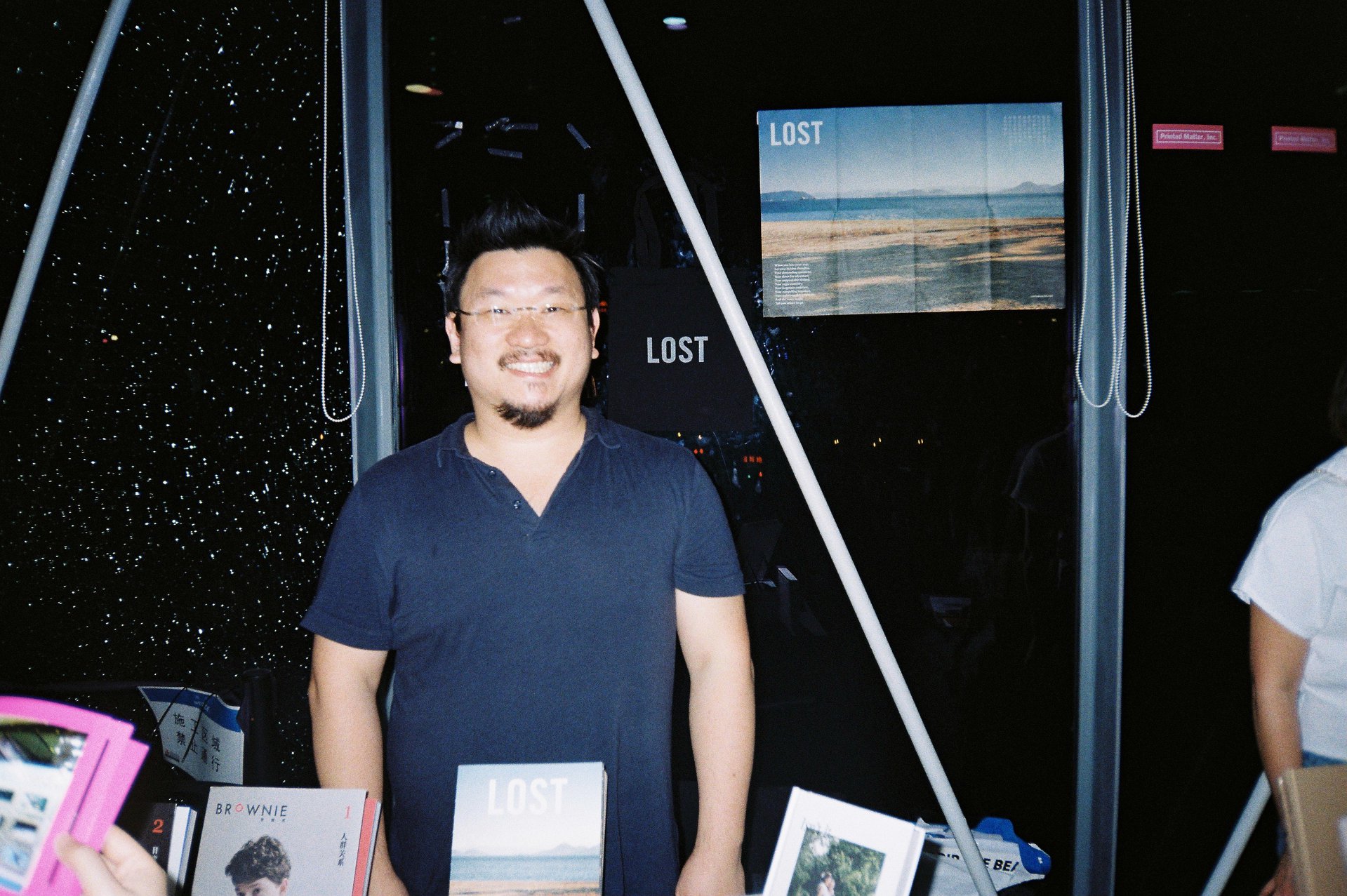
Nelson Ng, the founder of LOST Magazine
art4d: รู้จักครับ เราเคยเชิญให้เขามาพูดในเลกเชอร์ แล้วก็จัดเวิร์คช็อปตอนงาน Bangkok Design Festival เมื่อสองปีที่แล้ว
SW: คือตอนนี้เขาเป็นเหมือนแหล่งข้อมูลออนไลน์เดียวของผมเลย ว่าโดยรวมแล้วในเอเชียตอนนี้มันมีอะไรเกิดขึ้นบ้าง ผมก็ตั้งตารอที่จะได้ออกไปเจอไปเห็นอะไรด้วยตัวเองเป็นครั้งแรกเหมือนกัน จากรูปงานปีที่แล้ว ดูเหมือนว่ามันก็มีงานที่น่าสนใจมากๆ อยู่นะครับ ไม่ใช่แค่ในส่วนของสิ่งพิมพ์แต่ยังรวมไปถึงงานกราฟิกและอะไรอื่นๆ ด้วย นี่ผมก็เผื่อที่ว่างในกระเป๋าเอาไว้เยอะเหมือนกันครับ เพราะคิดว่างานนี้น่าจะได้ขนอะไรใหม่ๆ กลับบ้านไปเยอะแน่ๆ (หัวเราะ)

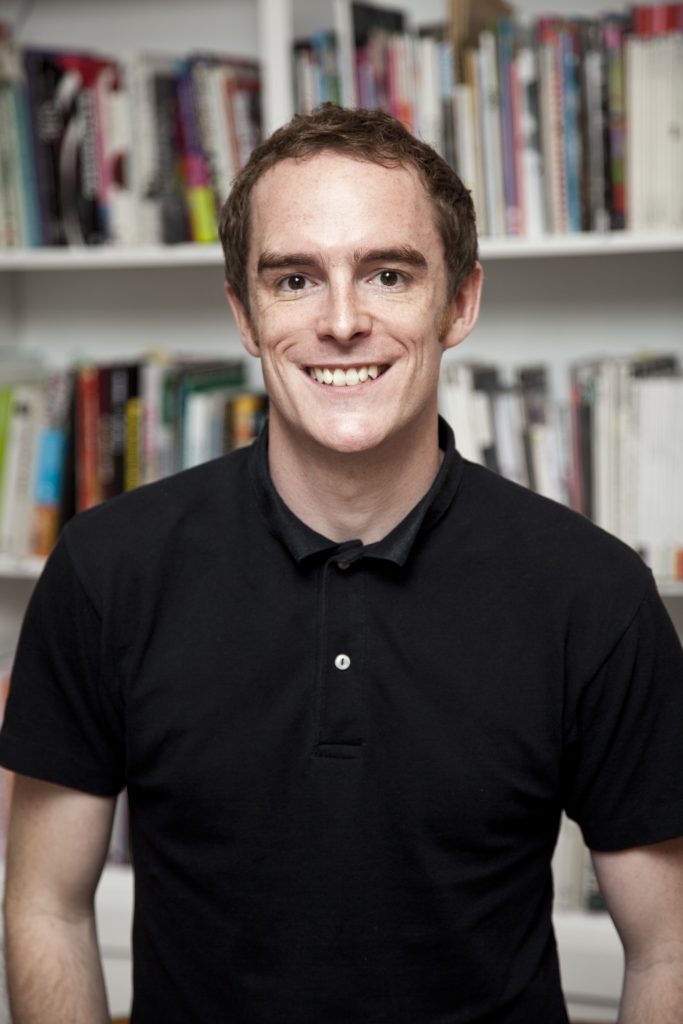
Steven Watson © Tom Medwell
art4d: Tell us about Stack.
Steven Watson: Stack is a service that searches out really great magazine then sends thousands of them out to people around the world every month. We started with a subscription service; so, when people sign up, you’ll never know what you’re going to get next but you know it right away that it’s going to be one of these lovely independent magazines. And over the years, we’ve added extra bits on. Now we also have an online shop, so you just go on buying magazines whenever you want; not everybody wants to be surprised, some people just want to choose the magazines they get.
We also launched the Stack Awards and we’re in our fifth year doing that now, where we basically get people from all around the world to submit their magazines. We put them in front of our expert judges, then we have a big party in November and hand out some beautiful trophies to people. And this year, it’s the first time we’re handing out money as well. So, the Magazine of the Year of this year gets a thousand pounds from Adobe InDesign.
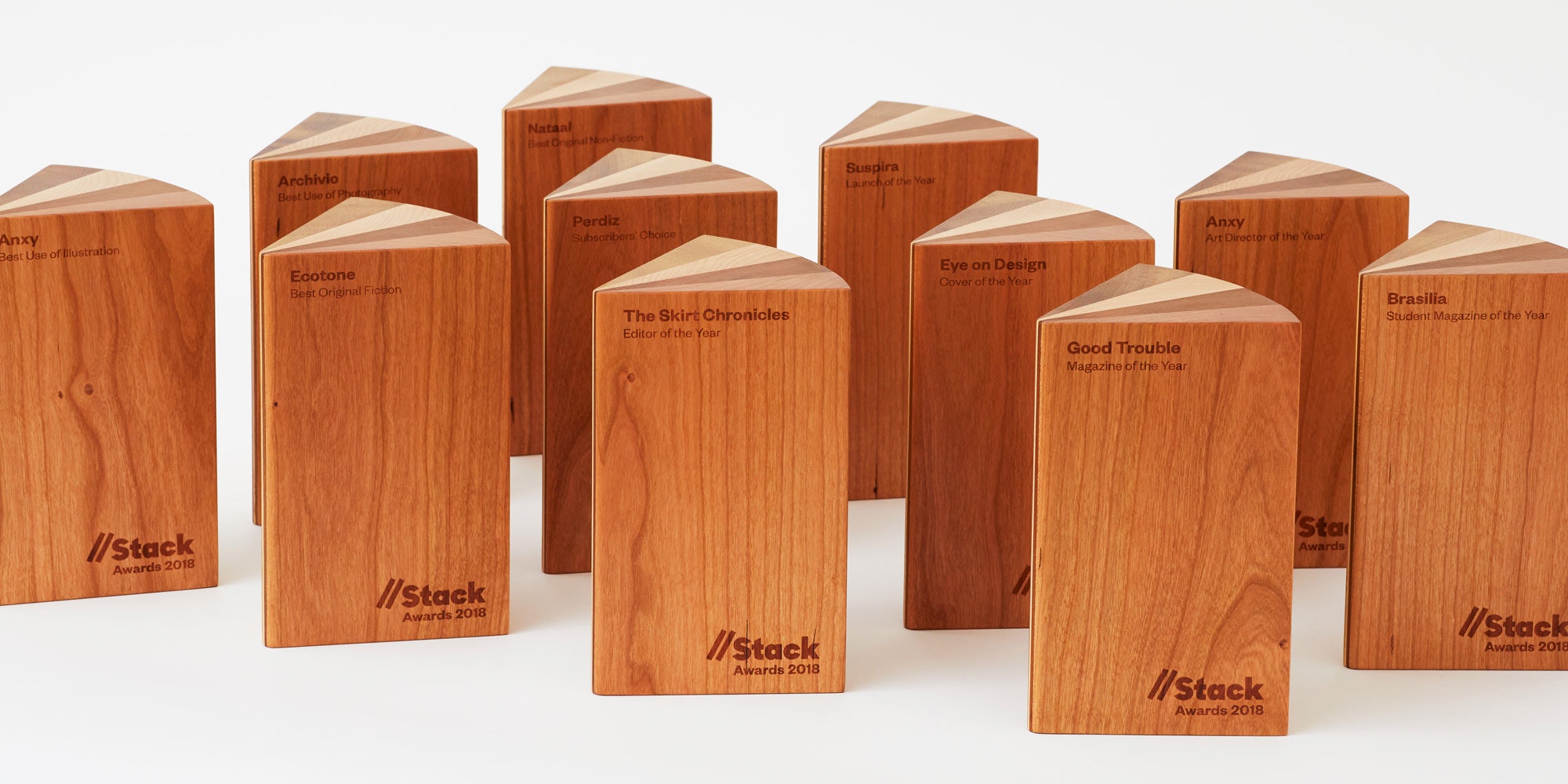
Ten categories of Stack Awards include Magazine of the Year, Launch of the Year, Editor of the Year, Art Director of the Year, Cover of the Year, Best Use of Photography, Best Use of Illustration, Best Original Non-Fiction, Best Original Fiction, and Student Magazine of the Year
art4d: What has been the motivation that has driven you to run Stack for 11 years now?
SW: That’s very simple. I like magazines.
art4d: Why do you like magazines?
SW: Why do I like them? Well, when I was studying English at university, I felt like magazines were a bit of a cheat because they are easier; you get nice big pictures, little pull quotes, lovely big headlines, and all these ways that lead you into a story, while obviously for most books you’d stop, it’s the text. I looked at books as well but I think I’ve been a life-long reader of magazines. Then after I left university and while working for an in-flight magazine, which was quite boring, it’s just so happened that below my office at the time there was an independent magazine shop. I guess I hadn’t really heard of independent magazines before but I was kind of, for most days, walking down there, looking at these beautiful magazines, and just becoming aware of these incredible things that none of my friends had heard of.
Through that, I found ones I liked and then started writing for some of them. Then if you’re writing for them, because they have nothing to pay, they would have a party when they had launched a new issue. So, I got to meet more people who were doing that. I basically realized that there’s this whole world of independent publishing and maybe I could help more people to discover it.

Stack picks the best independent magazines and delivers them to your door
art4d: What are the changes that you have observed happening to the print industry, especially to the independent magazines, since you set up Stack in 2008?
SW: Generally, I think there is much greater awareness of independent publishing right now. When I started Stack, I went out into London doing my research and I had a questionnaire. I’d stop people in the street and asked, “What do you think of independent magazines?” The most common response I got was people saying, “Oh, independent magazines. You mean like Vice Magazine?” and I said, “Well, it’s a multi-national corporation and that’s not really want I’m thinking of.” But if I were to do the same thing again, I think I’d more likely to get a respond like, “Oh, you mean like Little White Lies, Delayed Gratification, or The Gentlewoman,” or any of these magazines that have greater awareness right now. So, I think people are getting to know more about them nowadays, which is really helpful, and technology has made it way easier to start a magazine. That’s why we’re seeing more and more things coming through, because people know now that if they’ve got an idea, something they’re really passionate about, they can just turn that into a printed magazine if they want to.
art4d: But the changes you’ve mentioned also come with challenges as well, right?
SW: That’s right. Basically, if you are making an independent magazine, you need people to read them. So, in a way, it’s not always helpful when there are loads of independent magazines because you have to work so much harder. But, to be honest, it’s not even that you’re in competition with other independent magazines, you’re actually in competition with every other piece of media in the world.
We are living in this age of endless content access where there are so many things to try to keep up with the whole time. I think, as it’s become easier to create all kinds of media, then obviously more media is created and you have to find a way to write above the noise and to make your voice heard. That’s what independent magazines are able to do best. They have this very intimate understanding of who their readers are, and they also have these ways of seeing the world to these set passions, that they communicate very clearly in a very compelling way.
art4d: Why do you believe that print is not dead?
SW: I remember when I started Stack in 2008, the iPad came out two years after. Honestly, for a while, I thought that perhaps print was dead. You know, you got this new device in which people can read an article, watch a video, listen to some music, and do other things. Why would you want paper? At that point, I guessed it was useful that I wasn’t running Stack as a business. I’m running it because it is something that I want to do. It’s just that I like these magazines and think that maybe other people will like them too.
As time goes on, it has become clearer that one of the things that’s really special about prints is that it has all these limitations. You can’t message your friend while reading an article in print; you can’t get a pop-up notification or any alerts. So, you end up with this very limited and intimate experience where people now talk about that sensation when you get a piece of print in your hands, laying down on bed or sofa and, and your breath slows down. It’s like you can properly immerse yourself in it and that’s what I think us, humans, really like; we like to have that kind of relationship with a physical object, one which is not demanding.
Fast forward to the last few years, now we have the GDPR (General Data Protection Regulation) here in Europe. People are much more aware of their data as a part of human rights and that any companies shouldn’t be able to just spy on you all the time and follow the things that you are doing. I think that’s where prints get this other benefit because of, again, its limitations. When you’re reading something in print, nobody is tracking what you’re doing. Nobody is trying to sell an app at which you were looking at. And this is something I’m actually going to talk about in my presentation on Saturday at the Bangkok Art Book Fair as I think this has emerged as one of the greatest strength of prints, and that people want to have a simpler experience without the frights that can come with the digital.
art4d: For you personally, what is a ‘good’ magazine?
SW: For me, the thing I look for is the idea. It has to be a very compelling idea behind the magazine which is something I’ve never seen people talk about before. So, I’m just looking at my shelf here right now where there is this Japanese magazine called Tsurutokame, which is a fashion magazine for senior citizens in Japan. I mean, I’ve never come across that before. It’s completely new to me. There’s also this magazine which has concepts I’m quite familiar with called Victory. It’s a sport magazine in New York and they portray the magazine in a way that is completely different from anything else I’ve seen.
So, I think what’s important is that you have that really clear idea of what you’re going to do, and have that be stimulating because you haven’t seen it done like that before. And then I think after that it also depends on other variables like the production, the skills of the editor, the vision of the designers, etc., but the heart of it has to be the idea.

Victory, the journal of sport and culture (Issue 6 ‘Blood & Asphalt’)
art4d: What is your definition of an ‘indie’ magazine?
SW: Years ago, I spent a weekend in Hamburg at the first Indiecon 2014 and the theme of the conference was ‘Was ist Indie?’ And week after week of discussing, nobody could agree. But the best thing I heard there was “the chiefs are the makers,” and so that means the people who are financially responsible for the magazines are also involved in writing, taking photos, designing, or other parts of the magazine. That is an imperfect definition, but it’s the best one that I’ve heard.
art4d: This is going to be your very first time in Bangkok. What are you expecting to see or to experience from this city, as well as from the Bangkok Art Book Fair?
SW: One of the things that makes me really want to come is that I feel like we’ve really got a good handle of the magazine publishing here in the U.K. and kind of in Europe and the United States, but I know nothing about what’s happening in Asia. So, do you know Nelson Ng of LOST Magazine?
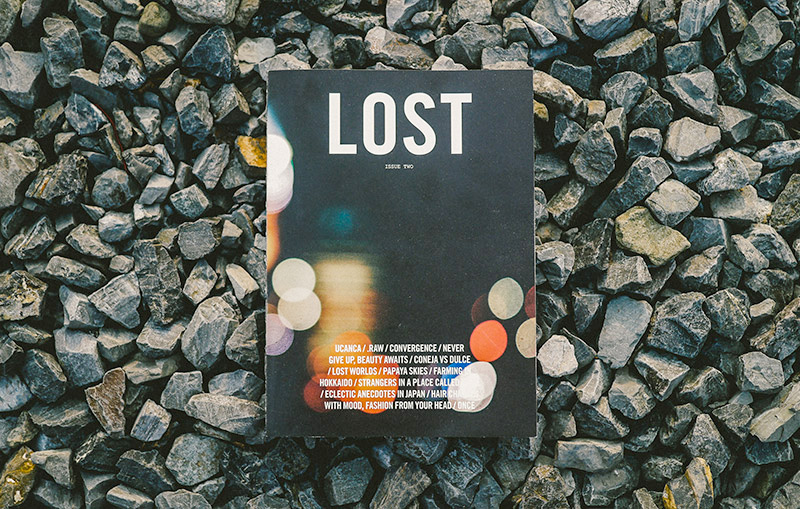
LOST is a magazine about self-discovery through travel
art4d: Absolutely. We invited him to give a lecture and conduct a workshop here for the Bangkok Design Festival two years ago.
SW: Well, at the moment he’s basically my only source of information online of what’s happening in Asia as a whole. So, I’m really looking forward to coming out and experiencing some of it myself, for the first time. Just looking at the sight from last year’s fair, it looked like there was some really interesting work there, not only in publications but also with graphics and design work generally. So, I’m basically leaving space in my suitcase because I’m hoping to come home with some new stuffs. [laughter]

